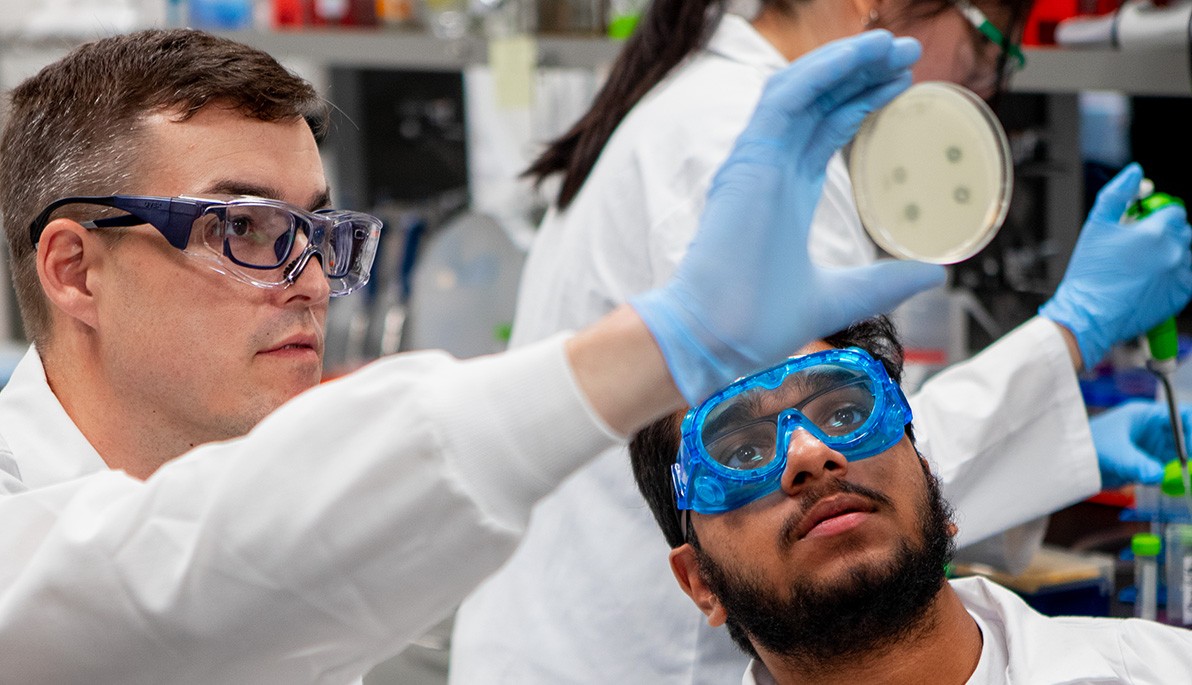
A Quest for Bacterial Assassins
February 8, 2023
Pictured: Associate Professor Bryan Gibb, Ph.D., left, and biology major Hamza Nagarwala are studying the potential of bacteriophages as a powerful weapon in the fight against antibiotic resistance.
The Centers for Disease Control and Prevention (CDC) estimates that more than 2.8 million antimicrobial-resistant infections occur each year in the United States, resulting in more than 35,000 deaths.
The more an antibiotic is used, the more rapidly bacteria become resistant, reducing drug effectiveness. So what other options might allow clinicians to combat antibiotic-resistant microbes?
That’s the question that Associate Professor of Biological and Chemical Sciences Bryan Gibb, Ph.D., and undergraduate biology student Hamza Nagarwala aim to solve as part of a collaborative research project with Washington University in St. Louis.
A major area of Gibb’s laboratory research focuses on understanding the therapeutic abilities of naturally occurring viruses called bacteriophages, or phages for short.
“Phages are the most abundant biological form on the planet. These naturally occurring viruses are professional bacterial assassins,” says Gibb. “They’re already working wonders in Eastern Europe, where doctors in countries like the Republic of Georgia have successfully used phage cocktails for decades.”
Discovered in the early 1900s, phages have been used to treat bacterial infections in the former Soviet Union and Central Europe for nearly 100 years. While the field is now starting to generate some interest in the United States, the Food and Drug Administration’s process for approving pharmaceuticals is not equipped to deal with bacterial agents like phages.
Now, through a collaborative research project with Washington University in St. Louis pathologist Deborah Veis, M.D., Ph.D., Gibb, and Nagarwala hope to demonstrate the potential of phages as a powerful weapon in the fight against antibiotic resistance.
Veis obtained strains of antibiotic-resistant bacteria from pediatric patients with osteomyelitis, a type of bone inflammation caused by a staph infection. Many antibiotics, including methicillin, amoxicillin, penicillin, oxacillin, and cephalosporins, are no longer effective against the bacteria responsible for these staph infections: methicillin-resistant Staphylococcus aureus (MRSA).
The New York Tech researchers are contributing to the larger project by hunting for staphylococcal phages that can naturally destroy the MRSA strains. In analyzing various “phage cocktails” from the Republic of Georgia, they aim to identify phages that can live in an environment of 37 degrees Celsius, the same temperature as the human body, and act on the MRSA. In this warm environment, some phages have the ability to “hijack” bacteria cells, using the cell’s resources to reproduce and make new phages, in turn killing the bacteria. The researchers are also monitoring closely for changes at the genetic level that could cause the phages to be rendered more or less effective.
Currently, the phage cocktails are being applied to the MRSA strains in a petri dish environment. However, if the team successfully identifies potential phage therapy candidates, Veis plans to test them against the MRSA in a mouse model experiment.
“The ultimate goal of our bacteriophage research is to find phages viable for clinical use,” says Nagarwala, who also presented the project to the Metropolitan Association of College and University Biologists and in a poster presentation at New York Tech’s SOURCE event (Symposium of University Research and Creative Expression) in 2022. “We’ve procured commercial phage cocktails manufactured for phage therapy and are in the process of isolating single phages on each strain. Upon the completion of this phase of the project, we hope the results can be used to study phage infection models in mice.”
The New York Tech researchers and Veis are eager to reach that next phase.
“Bacteria adopt different lifestyles in different tissues and cells, so it will be important to see how phages behave in our mouse models of infection,” says Veis. “It will be exciting to see if specific phages have real therapeutic potential.”
More Features

An Alumnus’ Commitment to the Environment
As an energy management graduate from New York Tech’s Vancouver campus, Jasdeep Gulati (M.S. ’22) is highly invested in educating people about environmental and climate sustainability.

Vancouver Faculty Win University-Sponsored Research Awards in New Program
The new Global Impact Research Grant (GIRG) program has been developed to keep Vancouver-based faculty connected to faculty and research projects being conducted on the university’s New York campuses.

Studying Climate Change One Degree at a Time
Junhua Qu (M.S. ’24) began her collegiate journey in Beijing. But, her interest in climate change took her to New York Tech’s Vancouver campus to study energy management.
